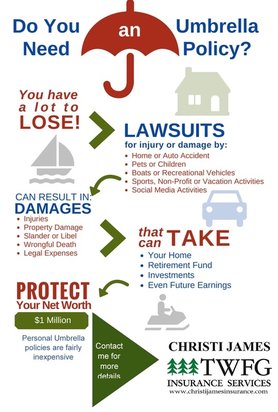Good thing you have insurance. But, wait, your policy covers $300,000 of liability, and, in a lawsuit, you’re judged liable for $1 million. That leaves $700,000 left to pay. How will you cover it? If you have umbrella insurance and your policy covers the incident, the additional $700,000 will come from your policy. If not, it will come from the assets you have now, such as your home and savings, and from future assets, such as your wages or inheritance.
It only takes one serious accident and a resulting lawsuit to put everything you own – and will own – at risk. Get all your questions about umbrella insurance answered below.
What Is Umbrella Insurance? Umbrella Insurance is a form of liability insurance that will supplement your basic liability policies, such as your auto, home or renters insurance. An umbrella liability policy covers a much higher limit and goes above and beyond claims directly relating to your home and auto. The main purpose of your umbrella policy is to protect your assets from an unforeseen event, such as a tragic accident in which you are held responsible for damages or bodily injuries. If another party files a lawsuit against you, your umbrella coverage will pay for the damages you’re legally responsible for up to the policy limit.
What Does Umbrella Insurance Cover? An umbrella policy provides additional coverage or “excess liability” above the limits of your basic policies. It can protect you from bodily injury liability claims and property damage liability claims. Umbrella policies also provide a broader form of coverage and can help cover legal fees, false arrest, libel, and slander.
How Does Umbrella Insurance Work? Your umbrella insurance can come into play if you are found liable and need to pay damages, or if you are sued and need to pay for your legal defense – even if the result is that you are not found to be responsible. An umbrella policy only pays once your basic liability limits have been exhausted or the claim is excluded from the basic liability coverage. The claim will be made against you, the policyholder, on behalf of the wronged party. Then your insurance company may pay the settlement amount up to the limits of your coverage. If the settlement amount exceeds your coverage limits, you are responsible for paying the remaining amount out of pocket.
Why Is Umbrella Insurance Important? Your car, house, investments and retirement accounts, as well as your normal checking and savings accounts and even future income, are all considered assets. It is important to know that if you are sued for a lot of money and do not have enough liability insurance or an umbrella policy to cover those costs, all of your assets are exposed. People typically choose to buy an umbrella policy because they want to prevent the possibility of financial ruin due to one misstep or unforeseen accident. Umbrella insurance can provide the protection to prevent such an outcome.
How Much Umbrella Insurance Should I Carry? When choosing your coverage limits, consider three things:
1. The risks you may face. Consider risks as a homeowner or renter, the risk of causing an accident during your work commute, and any potentially dangerous activities you participate in that could put those around you at risk.
2. The value of your assets. These include properties, possessions, stocks, bonds, savings and retirement funds. The more assets you have to protect, the higher the umbrella policy limit you should consider.
3. The potential loss of future income. Because liability lawsuits can result in loss of both current assets and future income, even those with few assets to protect may want to consider the long-term ramifications of a serious claim.
When you review your future income, consider your earning potential. You might not have many assets now, but if you’re on track for a high paying career, you could be involved in a lawsuit that can target money you haven’t earned yet.
Does Umbrella Insurance Cover Lawsuits? Umbrella insurance can cover lawsuits and liability claims that do not result in legal action. Protecting assets against potential lawsuits is the main motivator for many people to purchase umbrella insurance. The main purpose of liability insurance is to protect you if you’re found liable for causing property damage or bodily injuries, and for your legal defense even if you are not found liable. When someone sues you, they are seeking reparations for damages you are perceived to have caused. Your primary liability insurance will pay the costs associated with the claim after your deductible has been met, and up to the limits of the liability policy. If the wronged party is awarded more than your standard liability coverage, the umbrella insurance begins to pay out.
Does Umbrella Insurance Cover Property Damage? Umbrella insurance will cover property damage in most but not all circumstances. We all know accidents happen, and you never know how extensive the property damage can be until you get an estimate. If you cause an accident involving several cars, everyone may walk away unscathed but the property damage to other cars can be enough to break the bank.
Does Umbrella Insurance Cover Dog Bites? Umbrella insurance covers dog bites under most circumstances. If your dog bites your neighbor, you are liable for that person’s bodily injury. Umbrella insurance can also cover you if your neighbor decides to seek legal recourse. Additionally, depending on the insurance company issuing your homeowners policy, an umbrella policy may be your only real protection if you own certain aggressive dog breeds.
Does Umbrella Insurance Cover Uninsured Motorists? The majority of umbrella insurance policies do not cover uninsured motorists. An umbrella policy is meant to cover any property damage or bodily injury you cause. In a scenario where an uninsured or underinsured motorist causes an accident and does not have the coverage required to pay for your property damage or injuries, you would typically need to have uninsured/underinsured motorists coverage in place to receive compensation.
Does Umbrella Insurance Cover Car Rentals? You can insure a rental car several different ways, including through your primary policy or through the rental agency itself. To fully protect yourself financially in the event that you cause an accident while driving a rental car, you may consider purchasing an umbrella liability policy. Umbrella insurance is a good policy to have if you want to make sure you have coverage in unpredictable situations, including when you rent a car.
Does Umbrella Insurance Cover Rental Property? Anyone with assets or those who may be at risk of a lawsuit can benefit from the protection of liability insurance. If you are a renter and have a renter’s insurance policy, you can purchase an umbrella policy to extend your liability limits beyond the standard coverage. If you are held liable for causing property damage or bodily injury, your umbrella insurance will help protect your assets and cover any legal fees.
Should Landlords Have Umbrella Insurance? An umbrella policy can be a wise investment for landlords. If you own rental property, you are responsible for making sure your property is safe for your tenants and your guests. An umbrella policy will most likely protect you in several different scenarios, such as:
- A third party sues you for damages your tenants cause
- A visitor is injured in a fall due to a broken step or handrail
- A guest is injured in your workout or pool facilities
- You neglect to change the locks on a unit and a former resident with a key burglarizes the apartment
How Much Does Umbrella Insurance Cost? There are a number of factors that may affect your umbrella insurance costs including: your net worth, your location, your credit history, driving records in your household, a teenager in your household, and your risk profile. An average cost of about $380 per year can provide $1 to $2 million of protection.
If you have a substantial amount of personal net worth, you may want to invest in umbrella insurance to protect yourself and your assets. At TWFG Insurance Services in Aledo, Texas, we are more than happy to visit with you to determine your specific risk factors and the amount of umbrella insurance needed to protect your current and future assets.


